高考必考语法精讲精练专题十三:虚拟语气与情态动词 含解析
高中英语情态动词和虚拟语气讲解
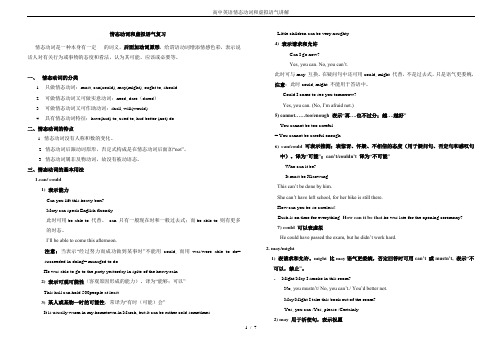
情态动词和虚拟语气复习情态动词是一种本身有一定的词义,后面加动词原形,给谓语动词增添情感色彩,表示说话人对有关行为或事物的态度和看法,认为其可能、应该或必要等。
一、情态动词的分类1.只做情态动词:must, can(could), may(might), ought to, should2.可做情态动词又可做实意动词:need, dare(dared)3.可做情态动词又可作助动词:shall, will(would)4.具有情态动词特征:have(had) to, used to, had better (not) do二、情态动词的特点1.情态动词没有人称和数的变化。
2. 情态动词后跟动词原形,否定式构成是在情态动词后面加“not”。
3. 情态动词属非及物动词,故没有被动语态。
三、情态动词的基本用法1.can/ could1) 表示能力Can you lift this heavy box?Mary can speak English fluently.此时可用be able to 代替。
can 只有一般现在时和一般过去式;而be able to 则有更多的时态。
I’ll be able to come this afternoon.注意:当表示“经过努力而成功做到某事时”不能用could, 而用was/were able to do= succeeded in doing= managed to doHe was able to go to the party yesterday in spite of the heavy rain.2) 表示可观可能性(客观原因形成的能力)。
译为“能够;可以”This hall can hold 500people at least.3) 某人或某物一时的可能性,常译为“有时(可能)会”It is usually warm in my hometown in March, but it can be rather cold sometimes.Little children can be very naughty.4) 表示请求和允许----- Can I go now?----- Yes, you can. No, you can’t.此时可与may 互换。
历年高考英语语法精讲精练-情态动词和虚拟语气有解析.doc
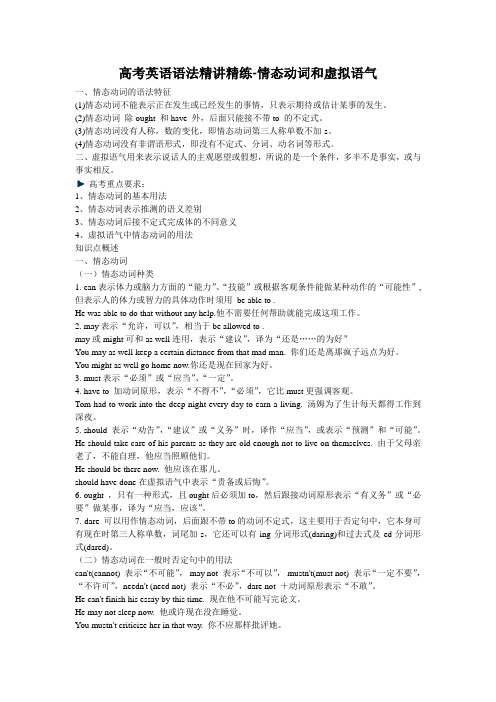
高考英语语法精讲精练-情态动词和虚拟语气一、情态动词的语法特征(1)情态动词不能表示正在发生或已经发生的事情,只表示期待或估计某事的发生。
(2)情态动词除ought 和have 外,后面只能接不带to 的不定式。
(3)情态动词没有人称,数的变化,即情态动词第三人称单数不加-s。
(4)情态动词没有非谓语形式,即没有不定式、分词、动名词等形式。
二、虚拟语气用来表示说话人的主观愿望或假想,所说的是一个条件,多半不是事实,或与事实相反。
高考重点要求:1、情态动词的基本用法2、情态动词表示推测的语义差别3、情态动词后接不定式完成体的不同意义4、虚拟语气中情态动词的用法知识点概述一、情态动词(一)情态动词种类1. can表示体力或脑力方面的“能力”、“技能”或根据客观条件能做某种动作的“可能性”, 但表示人的体力或智力的具体动作时须用be able to .He was able to do that without any help.他不需要任何帮助就能完成这项工作。
2. may表示“允许,可以”,相当于be allowed to .may或might可和as well连用,表示“建议”,译为“还是……的为好”You may as well keep a certain distance from that mad man. 你们还是离那疯子远点为好。
You might as well go home now.你还是现在回家为好。
3. must表示“必须”或“应当”、“一定”。
4. have to 加动词原形,表示“不得不”,“必须”,它比must更强调客观。
Tom had to work into the deep night every day to earn a living. 汤姆为了生计每天都得工作到深夜。
5. should 表示“劝告”,“建议”或“义务”时,译作“应当”,或表示“预测”和“可能”。
高考英语情态动词和虚拟语气考点总结及真题解析

考点13 情态动词和虚拟语气【命题解读】英语中常用的情态动词主要有can,could,may,might,must,will,would,shall,should,ought to,dare,need,used to,had better等。
在学习情态动词时应注意以下几点:同一情态动词表示不同的意义的情况;情态动词后跟各种形式的用法;尤其要注意"情态动词+完成式"是高考中的重点所在。
对虚拟语气的考查重点在于根据句子的语境灵活多样地运用虚拟语气,宾语从句中虚拟语气的应用,交际用语中为表示委婉而使用的虚拟语气,含蓄条件句中的虚拟语气,以及特殊句型中的虚拟语气等。
【命题预测】情态动词是2021年各地高考试题中的必考项目,每年高考单独命题区的单项填空必有一道考查情态动词的项目。
新课标卷主要在语法填空和短文改错中考查。
考点依次是:推测(可能性)→请求/允许→必要性→特殊用法。
试题的立意不偏不怪,但有效信息越来越隐蔽,语境越来越真实,考查角度越来越细致,这些因素在很大程度上增加了试题的难度。
情态动词和虚拟语气与动词的时态和语态相结合的考查是近年来高考的趋势。
【复习建议】情态动词:1. 掌握情态动词的基本用法;2. 掌握情态动词表达"情感、态度、语气等"方面的用法。
虚拟语气:1. 掌握虚拟语气的基本用法;2. 掌握含蓄虚拟条件句的用法;3. 掌握主从句时间不一致的虚拟条件句的用法;情态动词考向一情态动词的基本用法1)can,could与be able to1.表示能力,意为"能,会"。
☞Many people can use the computer.许多人会用电脑。
☞If you have a good sleep,you will be able to work out this problem.如果你好好睡一觉,你将能够解出这道题。
☞I could have worked out the problem,but I was too nervous.我本来可以解决这个问题,但我太紧张了。
高考英语复习 语法专题精讲精练 情态动词和虚拟语气
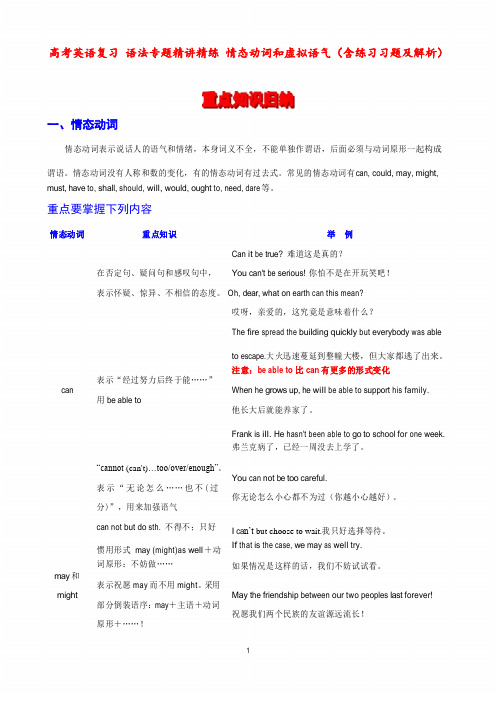
高考英语复习语法专题精讲精练情态动词和虚拟语气(含练习习题及解析)一、情态动词情态动词表示说话人的语气和情绪,本身词义不全,不能单独作谓语,后面必须与动词原形一起构成谓语。
情态动词没有人称和数的变化,有的情态动词有过去式。
常见的情态动词有c an,could,may,might, must,have to,shall,should,will,would,ought to,need,dare等。
重点要掌握下列内容情态动词重点知识举例在否定句、疑问句和感叹句中,Can it be true?难道这是真的?You can't be serious!你怕不是在开玩笑吧!can 表示怀疑、惊异、不相信的态度。
Oh,dear,what on earth can this mean?哎呀,亲爱的,这究竟是意味着什么?The fire spread the building quickly but everybody was ableto escape.大火迅速蔓延到整幢大楼,但大家都逃了出来。
注意:be able to比can有更多的形式变化表示“经过努力后终于能……”When he grows up,he will be able to support his family.用be able to他长大后就能养家了。
Frank is ill.He hasn't been able to go to school for one week.弗兰克病了,已经一周没去上学了。
“cannot(can't)…too/over/enough”。
You can not be too careful.表示“无论怎么……也不(过你无论怎么小心都不为过(你越小心越好)。
分)”,用来加强语气can not but do sth.不得不;只好惯用形式may (might)as well+动词原形:不妨做……I ca n’t but choose to wait.我只好选择等待。
高考英语:虚拟语气全解析(含具体讲解,习题及答案)
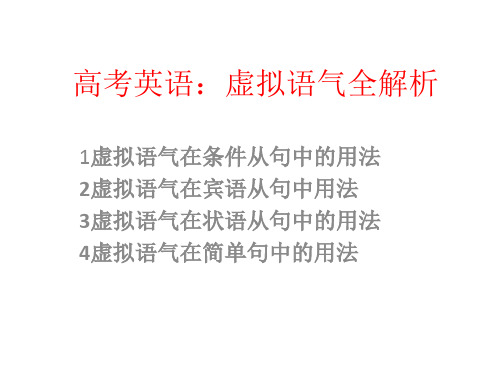
例如:
I wish (ed) I could (would, might) go to the moon in a
与将来事实相反 动词过去式, would/ should/ should + 动词原 could/ might + 动 形,were to + 动 词原形 词原形
• 注: 主句中的should只用于I、we,但在美国 英语中,should常被would代替;从句中的 should 可用于各种人称。
例如:
I would rather he stayed at home now. 我宁愿他现在在家里.
he stayed at home tomorrow. 我宁愿他明天在家里.
he had stayed at home yesterday. 我宁愿他昨天在家里 ( 4 ) wish=if only+从句(从句谓语动词有三种形式) ①would (could, might) +动词原形(与过去事实相反) ②动词过去式(与现在事实相反) ③had+过去分词或用could have+ 过去分词(与过去事 实相反)
现将虚拟条件从句和主句的动词形式列表如下与现在事实相反动词的过去式的过去式一般用werewouldshouldcouldmight词原形与过去事实相反had过去分词wouldshouldcouldmight过去分词与将来事实相反动词过去式should动词原形wouldshouldcouldmight主句中的should只用于iwe但在美国英语中should常被would代替
• 如果假设的情况是过去或现在都不存在的,或将来不大 可能发生的,则是虚拟条件句。如: If he had seen you yesterday, he would have asked you about it. 如果他昨天 见到你,他会问你这件事的。(事实上他昨天没见到你, 因此也未能问你这件事。)
高考英语情态动词和虚拟语气讲解
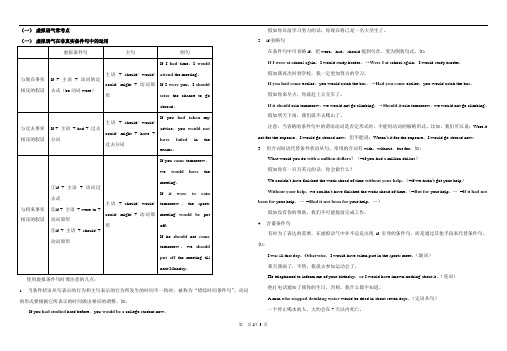
(一)虚拟语气常考点(一)虚拟语气在非真实条件句中的运用使用虚拟条件句时要注意的几点:1.当条件状语从句表示的行为和主句表示的行为所发生的时间不一致时,被称为“错综时间条件句”,动词的形式要根据它所表示的时间做出相应的调整。
如:If you had studied hard before,you would be a college student now。
假如你以前学习努力的话,你现在将已是一名大学生了。
2.if省略句在条件句中可省略if,把were,had,should提到句首,变为倒装句式。
如:If I were at school again,I would study harder。
→Were I at school again,I would study harder。
假如我再次回到学校,我一定更加努力的学习。
If you had come earlier,you would catch the bus。
→Had you come earlier,you would catch the bus。
假如你来早点,你就赶上公交车了。
If it should rain tomorrow,we would not go climbing。
→Should it rain tomorrow,we would not go climbing。
假如明天下雨,我们就不去爬山了。
注意:当省略的条件句中的谓语动词是否定形式时,不能用动词的缩略形式。
比如,我们可以说:Were it not for the expense,I would go abroad now。
但不能说:Weren’t it for the expense,I would go abroad now。
3.用介词短语代替条件状语从句。
常用的介词有with,without,but for。
如:What would you do with a million dollars?(=if you had a million dollars)假如你有一百万美元的话,你会做什么?We couldn’t have finished the work ahead of time without your help。
高考英语语法--虚拟语气,助动词与情态动词

高考专题虚拟语气I、重点难点解析虚拟语气的高考命题导向:虚拟语气表示说话人的愿望、假设、猜测或建议,而不是表示客观存在的事实。
真实语气与虚拟语气的区别主要在谓语动词的形式上。
在做题时,要根据语境判断出是与那种时态相反的虚拟语气。
一虚拟语气在从句中的用法和构成一览表二其他要注意的事项1. 虚拟语气中出现be的过去式,只能用were。
2. suggest表“暗示、表明”和insist表示“坚持认为”,其后的宾语从句用陈述句语气。
例如:You pale face suggests that you are ill. / He insisted that he was right.3. if虚拟语气条件句中如有had, should, were,可省略if, 将其提前引起倒装。
例如:Were I you, I would remain. / Had you told me earlier, I wouldn’t have missed it.4. 可用without, but for(“要不是”)代替虚拟语气条件句。
例如:But for your help, I would have failed the exam.Without air there would be no life.5.as if/though, even if/though也可以不用虚拟,表示真实的情况。
例如:It looks as if it is going to rain.II、实战演练用所给动词的适当形式填空1.---If he ________________ (warn), he ________________ (not take) that food.---Luckily he was sent to the hospital immediately.2.When a pencil is partly in a glass of water, it looks as if it _________________ (break).3.I would rather they _________________ (not hear) of the news.4.I wish I _______________ (have) a room of my own when I was a child.5.To the surprise of the public, the identification of the cause of such a simple event ___________________ (take)more than a year.6.Without air to hold some of the sun’s heat, the earth at night _______________ (be) freezing cold, too cold for us tostay.7.If I had worked harder at school, I _____________________(sit) in a comfortable office now.8.Her pale face suggested that she _____________ (be) ill, and her colleagues suggested that she _____________(have) a medical examination.9.I insisted he ____________ (go) to see a doctor, but he insisted nothing __________ (be) wrong with him.10.He asks that he _______________ (give) an opportunity to explain why he’s refused to go there.11.It is high time we _____________ (get) down to discussing this plan.12.If it were not for the fact that you ___________ (be) too busy, I would ask you to help me do this right now. (=butfor)13.Who do you suggest __________________ (send) to work there?14.I would have come earlier, but I ________________ (not know) that you were waiting for me.15.If it _______________ (rain) tomorrow, the outing would be cancelled.高考专题---虚拟语气2多数中国人对虚拟语气的理解是:虚拟语气表示说话人的愿望,是假设的,虚构的,与事实相反的,或者是不太可能的。
情态动词和虚拟语气讲解

情态动词和虚拟语气一、命题趋势高考中,短文改错和语法填空主要以情态动词误用,情态动词后实意动词的形式错误或时态错误等考察对情态动词和虚拟语气的理解和运用。
二、考纲内容1.熟悉情态动词常见的意义、作用、用法及变化形式;了解情态动词与进行时、完成时连用时所表达的意义。
2.熟悉非真实条件虚拟语气的形式、意义;了解虚拟条件的省略及混合虚拟条件语气;了解名词性从句、方式状语从句中的虚拟语气情况。
三、情态动词(一)情态动词1.情态动词的概述情态动词主要用以表明说话者对某一行为的态度和观点,主要包括揣测、判断、需要、可能、各种意愿等。
2.情态动词的特征(1)有一定的词义,但不能单独作谓语。
他们要和动词原形一起构成谓语。
(2)适用于主语的各种人称和数(have to 例外,当其主语是第三人称单数时用has to。
)(3)后接动词原形。
(二)情态动词的用法1.can, could(1)表示能力:can表示现在的能力,could表示过去的能力。
例:Although he is only four, he can play the piano.(2)表示请求:could 不表示过去,只表示客气、委婉的口气,但回答时必须用can.例:--Could I borrow your bicycle?--Yes, you can/ No, you can’t.(3)表示可能行:一般用在否定句和疑问句中,could也可用于肯定句。
例:That can not be Mary, for she is in hospital.注意:can有时也用于肯定句,表示理论上的可能性或一时的情况,常译为“有时会”。
例: Mother can be very forgetful sometimes.辨析: can与be able to(1)表示能力时,can与be able to意义相同,但是can仅用于一般现在时及一般过去时,be able to可用于更多时态。
- 1、下载文档前请自行甄别文档内容的完整性,平台不提供额外的编辑、内容补充、找答案等附加服务。
- 2、"仅部分预览"的文档,不可在线预览部分如存在完整性等问题,可反馈申请退款(可完整预览的文档不适用该条件!)。
- 3、如文档侵犯您的权益,请联系客服反馈,我们会尽快为您处理(人工客服工作时间:9:00-18:30)。
高考必考语法精讲精练语法专题十三:虚拟语气与情态动词情态动词和虚拟语气是高考重要考点,《2017年普通高等学校招生全国统一考试大纲》附录语法项目表中列出了虚拟语气以及情态动词。
2015年高考全国卷Ⅰ第79题(短文改错)考查了情态动词must后面接动词原形。
2016年高考全国卷Ⅰ没有考查情态动词与虚拟语气。
2017年高考全国卷Ⅰ没有考查情态动词与虚拟语气。
知识框架一. 含有条件状语从句的复合句(以do为例;S=主语)例如:①If I were you, I would apply for the job.②If I had the money, I would buy it.③If I were given another chance,I would do it better.④If I had taken your advice, I would have made great progress.⑤If it had not been for your help, I wouldn’t have finished the work so easily.⑥If it should rain tomorrow,I would stay at home all day.⑦If you were to come tomorrow,I could wait for you at home.注意:在书面语中,条件从句可以不用连词if,而将谓语中的were,had或should 等移至主语之前构成倒装句。
例如:①Were I you, I would apply for the job.②Had I taken your advice, I would have made great progress.③Should it rain tomorrow,I would stay at home all day.二、错综时间的条件句虚拟条件句中的主句和从句涉及的动作发生的时间不一致,这时主句和从句的谓语形式应按照各自动作发生的实际时间来表达。
例如:①If you hadn't watched TV yesterday, you wouldn't be so sleepy now. (从句yesterday说明过去,主句now说明现在)②If they had left home early this morning, they would arrive in half an hour. (从句说明过去,主句说明将来。
)③If you hesitated this moment, you might suffer in the future. (从句说明现在,主句说明将来)三、含蓄条件句非真实条件句中的条件从句有时不表达出来,只暗含在上下文中,这种句子叫做含蓄条件句。
含蓄条件句有三种情况:1.条件暗含在单词短语中:常见介词有with假如有, without假如没有, but for要不是因为;连词有or/ otherwise(前句用陈述语气,后句用虚拟);but(前句为虚拟,后句陈述)例如:①He would not get such a result without your help. (条件暗含在介词短语without your help= if you hadn’t helped him中)②But for you, I could not be recovered so soon. (条件暗含在But for you= If you hadn’t helped me中)③He must have been there, or he never could know the place so well.(暗含条件是连词or;后句为虚拟)④I would have been to your place, but I was really too busy.=I was really too busy, or/ otherwise I would have been to your place.⑤She was ill, otherwise she would have been present at the meeting. (条件通过连词otherwise/ or表示出来If she had not been ill...)2.条件可根据上下文推理出①They could have won.(条件可能是if they had been patient )②Such mistakes could have been avoided.(条件可能是if you had been more careful )③Why didn't you tell me about it I should have helped you.(条件可能是if you had told me about it)④-- Did you go to see him yesterday?-- I would have, but someone come to visit me.(条件是if no one had come to visit me)3.条件用其他形式来表示①Suppose you were in my shoes, what would you do? (用suppose/ supposing/ providing等词表示if)②To talk with her, you would know she could not hear well.(不定式有假设的意思,相当于If you should talk with her...)③Left to himself, he could not have finished the work.(动词的-ed形式表示条件If he had been left to himself...)二. 虚拟语气用在宾语从句中sb. did(were)…(表现在)1. wish+that sb. had done… (表过去)sb. would/could do…(表将来)例如:①I wish I knew his address.②I wish he hadn’t been rude to his parents.③He wishes we would go with him.例如:①I’d rather you posted the letter right away. (现在)②I’d rather I hadn’t said such unkind things to you.(过去)③I'd rather you came here for the answer tomorrow .(将来)3. 表示“坚持、建议、决定、要求、命令”(“坚决要命”)等主观意向的动词之后的宾语从句,谓语用should+do,should可省略(注意:被动语态用should+be+done)。
这类词有:insist,suggest,advise,recommend,propose,decide,determine,demand,request,require,desire,order,command等。
例如:①The expert proposed that TV should be turned off at least one hour every day.②Experiments demand that accurate measurements be made.③She insisted that we should take up the matter at the meeting.注意:1. suggest 表示“暗示、表明”时,用陈述语气。
2. insist 表示“坚持说、坚持认为(某个事实)”时,用陈述语气。
例如:①Your pale face suggests that you are ill.②He insisted that he hadn’t stolen the money.三. 虚拟语气用在主语从句中It is demanded / necessary / a pity + that…等结构的主语从句,谓语动词用should do,should 可省略。
例如:①It is required that the students should not use mobile phones in their school.②It’s necessary that college students should master at least one foreign language.四.虚拟语气用在同位语从句中。
表示“坚持、建议、决定、要求、命令”(“坚决要命”)等主观意向的名词后同位语从句需用虚拟语气,其表达形式为should +do,should可以省略(注意:被动语态用should+be+done)。
这类名词常见的有:advice,suggestion,proposal,order,demand,desire,request,requirement,recommendation等。
例如:①He gave orders that the work (should) be started at once.②We are all for your proposal that the discussion ( should ) be put off.五.虚拟语气用在表语从句中。
表示“坚持、建议、决定、要求、命令”(“坚决要命”)等主观意向的的名词作主语时,表语从句需用虚拟语气,其表达形式为should +do,should可省略(注意:被动语态用should+be+done)这类名词主要有:advice, suggestion, order, proposal,demand,desire, request, requirement, recommendation等。
例如:①My suggestion is that the mayor (should) present the prizes.②His plan is that he should pass the exam first.六.虚拟语气用在定语从句中It is(about/high)time+that sb.did sth/should do sth. (注意:本句型中should不可省略)例如:①It's about time that we went home.②It’s high time that we should go home.注:在It/This/That +be+ the first time/second time that...句型中,从句中谓语动词用完成时态。
